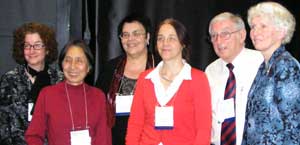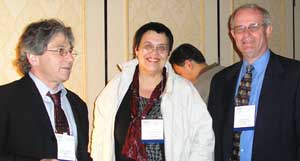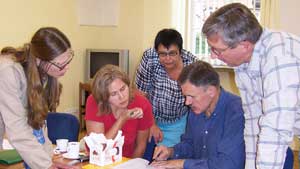Women in Physics in the Baltic States: Story of a Growing Consciousness Process
Dalia Satovskiene*

After session "International Gender Issues in Physics", with APS president Arthur Bienenstock and other speakers

FIP reception (March 2008, New Orleans)

Discussions with Colleagues
Five years ago when the President of the Lithuanian Physical Society Prof. Zenonas Rudzikas suggested to me to take part in the First IUPAP women in Physics conference (2002, Paris) as a member of the Lithuanian delegation I was going to refuse. I did not feel myself having a gender as a physicist. However the well organized sessions, the open and sincere life stories of outstanding women physicists cardinally changed my position and lead to the conclusion: the women in sciences problem exists!
In 2005 Lithuanian women physicists initiated the FP6 project “Baltic States Network: Women in Sciences and High Technology” (BASNET, http://www.basnet-fp6.eu/). The project was successful and got financial support for its implementation from the European Commission. The core of the problem of women in sciences consists of two main and closely connected parts: large disproportion of women and men scientists in sciences and inadequate representation of women on various levels of science and its management. The BASNET project was committed to solve the latter dimension of the problem. It was coordinated by Vilnius University. Among project partners were the Ministries of Education and Science, key universities, and research institutes from three Baltic States. The Polish Physical Society and the University of Bucharest also participated in the project.
The main goal of the BASNET project was the creation of the regional Strategy how to deal with the “women in sciences” problem in the Baltic States. The project implementation has some stages. The first one was an in depth sociological study aiming to find out disincentives and barriers women scientists face in their career and work at science and higher education institutions. Analysis of results revealed a wide range of problems concerned with science organization, management, and financing common for both counterparts. However it also proved the existence of discrimination against women in sciences. As main factors influencing women under-representation in Physics were found: the stereotypes existing in the society where physics is assigned to the masculine area of activity; failings of the science management system, where highest positions are distributed not using the institutionalized objective criteria but by voting, where the correctness of majority solutions is anticipated implicitly. In physics, where male scientists are the majority (they also usually compose executive boards, committees etc.) results of such procedures often are unfavorable for women. The same reasons also influence women “visibility” in the physicist’s community and as the consequence possibility to receive needed recourses for their research as well as appropriate presentation of results obtained. The study revealed the conservatism of the scientific community - reluctance to face problems existing in the scientific society and to start solving them. On the basis of the results obtained as good practice of other countries the common strategy of solving the problem of women in physics (sciences) in the Baltic States region was formulated. As changing the stereotypes is a long lasting process it, was decided firstly to concentrate strategy implementation plans on changes in science management policy tackling the problem from the „top“ and allowing to receive the quickest results. Each participating country is free to decide which problems are most important and be solved first.For example, on the basis of BASNET strategy the Lithuanian Ministry of Education and Sciences developed its strategy of Equal Gender Opportunities in Sciences and started its implementation. On the other hand, a great work was done to improve women-scientists communication in the Baltic States so necessary to make women more visible in the scientific community. For this the Data Basis of Baltic States Women in Sciences and HT was established. Together we became more confident and understood that we can change something in this world!
The BASNET project was finished at the very end of 2007. As its continuation on the basis of institutions - BASNET project partners, BASNET Forumas association was established. Its mission: to monitor the Strategy implementation in the Baltic States region. 2008 BASNET Forumas has become a full member of the European Platform of Women Scientists(EPWS, http://www.epws.org/), prestigious umbrella organization of women networks in EU, established by EC. The membership opened broader horizons for Baltic States’ women scientists to influence European science policy.

BASNET meeting devoted to the women in sciences Strategy (with representatives of Baltic States Ministries of Education and Science)
*Dalia Satkovskiene is President of BASNET Forumas and Associate Professor of Physics, Vilnius University, Lithuania.
Views and opinions expressed in articles are those of the authors and are not necessarily shared by the editor or the APS/FIP. We reserve the right to withhold names of authors in order to reduce the risk of additional personal hardship, for instance for speaking out on human rights issues.
